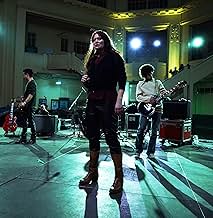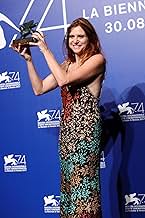Nico, 1988
- 2017
- Tous publics
- 1h 33min
NOTE IMDb
6,7/10
2,1 k
MA NOTE
Ajouter une intrigue dans votre langueThe last year of singer Nico's life, as she tours and grapples with addiction and personal demons.The last year of singer Nico's life, as she tours and grapples with addiction and personal demons.The last year of singer Nico's life, as she tours and grapples with addiction and personal demons.
- Réalisation
- Scénario
- Casting principal
- Récompenses
- 10 victoires et 21 nominations au total
Avis à la une
Everyone involved in the creation of 'Nico, 1988' deserves a huge amount of praise and respect for creating a film so unflinchingly honest, so authentic. Nico, eternally dressed up in others' wardrobes, in others' colours and artistic mirages, has finally been depicted on screen for who she really was, and because Christa Paffgen was infinitely more fascinating than 'Nico' ('Don't call me Nico, call me by my real name', she says early in the film to her new Mancunian manager, revealing the agenda of the filmmaking), 'Nico, 1988' is truly captivating.
'Nico, 1988' isn't a film for Velvet Underground fans (although I am most definitely one of those, especially the first two albums), and it isn't a film for anyone who believes Nico was a charming soft rock folk star after her VU years (songs written by others, yet more attempts by men to 'create' their warmer, sexier version of the Germanic, marketable beauty of Nico); not unlike her own music, this a film that is almost for no one, namely her passionate yet miniscule fan base ('No One Is There'). As Paffen says in the film, 'I'm selective about my audience'. That some people appear not to be able to understand this film or come to it with the wrong expectations seems in a strange way perfectly fitting. Nico is still ahead of her time, thirty years after her death.
Nico was one of the most interesting human beings of the twentieth century, which was probably the most fascinating, most cruel, most bizarre and most eventful century in human existence, and she seemed to experience most of what those years had to offer. Despite that, despite the myriad of famous people she dated, had children with and took heroin and LSD with (those looking for 'that' Nico are looking for the wrong Nico), depicting her on screen was never going to be easy, and as a massive fan of Nico's art I was going to be one of the hardest viewers to win over (I even bought a harmonium directly because I adored her music and songwriting, so casual fan I am not).
Not only did the film's authenticity suspend my disbelief, I was entirely convinced that Trine Dyrholm actually was Nico. In a better world, surely her performance would win an Oscar, but alas, too few people even know Nico's reality, know her mannerisms, know her booming funereal, avant-garde music that sounded hundreds of years old yet at the same time cutting-edge and far more intellectually advanced than her peers' guitar-based conventionality to truly appreciate how brilliant her homage to Paffgen is. She shows us the real Nico, the blunt, honest, temperamental, paranoid, bitter, at times disarmingly sweet, funny, suffering Nico, the Nico who was unable to be a good mother despite how much she loved her son. Nico, the completely unpretentious heroin abuser who was used up and spat out from the most pretentious of worlds: modelling, art and music, worlds people endlessly wanted to talk to her about with wide, hungry eyes. Nico seemed to live the life of a hundred people, to have experienced everything, yet she appeared to be the most lonely, broken and misunderstood of people, fuelled by a furious black flame of talent and a brutal honesty that most people could never come close to relating to.
Naturally, Nico was extremely wary of people, especially her own fans or anyone who revered her, and her on stage performances could be more like sneering attacks on the Lou Reed-wannabe poseurs in attendance. 'Nico, 1988's most thrilling and important scene is when an initially sceptical and heroin-craving Nico performs 'My Heart Is Empty' in Communist Czechoslovakia at an underground illegal gig for a small hardcore crowd. The fevered Nico seems to tap into the forbiddenness of the event, the authenticity, the risk, these are her people for once, this is real, she seems to be enjoying herself for the first time in the film. But like everything in Nico's existence it is a fleeting happiness, as the police raid the event and the band is forced to get into a packed car and flee the country before they end up in prison.
Nico's music was the sound of defeat, it was the sound she heard as a child that never left her, that continued to ring in her ears and haunt her for her entire life, the sound of bombs dropping on Berlin at the end of World War 2. As one world ended another was created, a new Europe, an apparent new hope for the western world, with liberation for women, for minorities, an exciting new playground of sexuality and hedonism to explore. Nico lived long enough to experience the emptiness of humanity both as the sound of bombs fell and as the sound of raucous New York Warhol parties went on into the night, and as the sad song says, 'Is That All There Is?' To Nico, both the sound of the bottom and the sound of the top were ghostly, transitory illusions, neither as real nor as powerful as her booming harmonium and harsh Germanic accent that still unnerves and inspires in 2018.
Hopefully this film encourages more people to listen to the real Nico and give her music a chance, for the difficult, scary and suffocatingly intense beauty of Nico's individuality deserves never to be forgotten, especially in a world that becomes more plastic, disposable and artistically barren by the year.
'Nico, 1988' isn't a film for Velvet Underground fans (although I am most definitely one of those, especially the first two albums), and it isn't a film for anyone who believes Nico was a charming soft rock folk star after her VU years (songs written by others, yet more attempts by men to 'create' their warmer, sexier version of the Germanic, marketable beauty of Nico); not unlike her own music, this a film that is almost for no one, namely her passionate yet miniscule fan base ('No One Is There'). As Paffen says in the film, 'I'm selective about my audience'. That some people appear not to be able to understand this film or come to it with the wrong expectations seems in a strange way perfectly fitting. Nico is still ahead of her time, thirty years after her death.
Nico was one of the most interesting human beings of the twentieth century, which was probably the most fascinating, most cruel, most bizarre and most eventful century in human existence, and she seemed to experience most of what those years had to offer. Despite that, despite the myriad of famous people she dated, had children with and took heroin and LSD with (those looking for 'that' Nico are looking for the wrong Nico), depicting her on screen was never going to be easy, and as a massive fan of Nico's art I was going to be one of the hardest viewers to win over (I even bought a harmonium directly because I adored her music and songwriting, so casual fan I am not).
Not only did the film's authenticity suspend my disbelief, I was entirely convinced that Trine Dyrholm actually was Nico. In a better world, surely her performance would win an Oscar, but alas, too few people even know Nico's reality, know her mannerisms, know her booming funereal, avant-garde music that sounded hundreds of years old yet at the same time cutting-edge and far more intellectually advanced than her peers' guitar-based conventionality to truly appreciate how brilliant her homage to Paffgen is. She shows us the real Nico, the blunt, honest, temperamental, paranoid, bitter, at times disarmingly sweet, funny, suffering Nico, the Nico who was unable to be a good mother despite how much she loved her son. Nico, the completely unpretentious heroin abuser who was used up and spat out from the most pretentious of worlds: modelling, art and music, worlds people endlessly wanted to talk to her about with wide, hungry eyes. Nico seemed to live the life of a hundred people, to have experienced everything, yet she appeared to be the most lonely, broken and misunderstood of people, fuelled by a furious black flame of talent and a brutal honesty that most people could never come close to relating to.
Naturally, Nico was extremely wary of people, especially her own fans or anyone who revered her, and her on stage performances could be more like sneering attacks on the Lou Reed-wannabe poseurs in attendance. 'Nico, 1988's most thrilling and important scene is when an initially sceptical and heroin-craving Nico performs 'My Heart Is Empty' in Communist Czechoslovakia at an underground illegal gig for a small hardcore crowd. The fevered Nico seems to tap into the forbiddenness of the event, the authenticity, the risk, these are her people for once, this is real, she seems to be enjoying herself for the first time in the film. But like everything in Nico's existence it is a fleeting happiness, as the police raid the event and the band is forced to get into a packed car and flee the country before they end up in prison.
Nico's music was the sound of defeat, it was the sound she heard as a child that never left her, that continued to ring in her ears and haunt her for her entire life, the sound of bombs dropping on Berlin at the end of World War 2. As one world ended another was created, a new Europe, an apparent new hope for the western world, with liberation for women, for minorities, an exciting new playground of sexuality and hedonism to explore. Nico lived long enough to experience the emptiness of humanity both as the sound of bombs fell and as the sound of raucous New York Warhol parties went on into the night, and as the sad song says, 'Is That All There Is?' To Nico, both the sound of the bottom and the sound of the top were ghostly, transitory illusions, neither as real nor as powerful as her booming harmonium and harsh Germanic accent that still unnerves and inspires in 2018.
Hopefully this film encourages more people to listen to the real Nico and give her music a chance, for the difficult, scary and suffocatingly intense beauty of Nico's individuality deserves never to be forgotten, especially in a world that becomes more plastic, disposable and artistically barren by the year.
Bookended by a radio interview in which German gothmother Nico likens eighties Manchester to postwar Berlin; dwelling upon her final years as a self-confessed "fat old junkie" with only fleeting flashbacks to her days as Andy Warhol's muse (her participation in 'La Dolce Vita' isn't even mentioned), the portrait that emerges is more like that of a punk rocker than of a hippy.
With a cigarette permenantly hanging from her lips Trine Dyrholm's throaty rendition of her songs give them a resonance similar to the latter day Marianne Faithfull. (To my untutored ear the way she croaks her way through 'Nature Boy' supplies a poignancy similar to Claire Trevor singing 'Moanin' Low' in 'Key Largo'.)
With a cigarette permenantly hanging from her lips Trine Dyrholm's throaty rendition of her songs give them a resonance similar to the latter day Marianne Faithfull. (To my untutored ear the way she croaks her way through 'Nature Boy' supplies a poignancy similar to Claire Trevor singing 'Moanin' Low' in 'Key Largo'.)
A haunting emotional bio pic that showcases the woman behind the haunting voice that has resonated with so many disaffected youths since the 1960's. The Velvet Underground and Nico has been my favorite album since early adolescence, so I was excited to dive into this one.
This film portrays the last two years in the life of Nico, the broken drug addled chanteuse, who at this point is basically treading water after a life scarred with sadness, regret and disappointment.
The film documents Nico's final tour across Europe with a new band.
I'm a big fan of Nico's music, and thought this was extremely well done, and I'm extremely critical of bio pics. It's a dark, somber and melancholy film that is at times extremely haunting and hypnotic. Trine Dyrholm is fantastic in the role of Nico; her nihilistic and often razor tongued balancing act across an intense emotional terrain inject a tangibility into the film. Bravo!
This film portrays the last two years in the life of Nico, the broken drug addled chanteuse, who at this point is basically treading water after a life scarred with sadness, regret and disappointment.
The film documents Nico's final tour across Europe with a new band.
I'm a big fan of Nico's music, and thought this was extremely well done, and I'm extremely critical of bio pics. It's a dark, somber and melancholy film that is at times extremely haunting and hypnotic. Trine Dyrholm is fantastic in the role of Nico; her nihilistic and often razor tongued balancing act across an intense emotional terrain inject a tangibility into the film. Bravo!
A strong biographical drama portraying the last years of singer Nico, former Velvet Underground. It develops well her uneasy character, her personal relations, her artistic view. The movie is good in all technical traits. However, what is impossible not to highlight is the outstanting performance by Tirine Dyrholm. He is simply amazing in the leading role, showing all the anger, sadness, impatience, impulsiveness, sometimes vatious of these feelings at once! As I read in two otber review, if the world were better (or if Acadeny Awards were serious), she would have certainly won the Oscar as the best actress.
I rated this 8/10. Maybe I should have rated it higher. There are parts of this film that I am not sure if they are flawed or genius. A bit like Nico's ouevre, so that is perhaps appropriate. I was utterly transfixed for the duration of the movie. And yet by what I do not know. Relatively little happens. There are long silences. Yet both what is said and not said manages to restlessly slip away from cliche, and at the end I felt like I understood something I did not understand before. I am not sure who I could recommend this film to, yet I feel like I experienced something masterful
Le saviez-vous
- AnecdotesThe flashbacks to the 1960s show Nico in footage shot by Jonas Mekas.
- GaffesThe amplifier that Alex plays is a Fender Frontman 212R which didn't exist in the 1980s. It's is a budget model originally introduced in the mid-1990s. The logo on the back of the amp can clearly be seen in during the Prague concert when Nico walks off the stage.
- Citations
Christa Päffgen a.k.a Nico: Am I ugly?
Richard: Yes. Really.
Christa Päffgen a.k.a Nico: Good. I wasn't happy when I was beautiful.
- ConnexionsEdited from Scenes from the Life of Andy Warhol: Friendships and Intersections (1990)
- Bandes originalesThese Days
Performed by Trine Dyrholm
Meilleurs choix
Connectez-vous pour évaluer et suivre la liste de favoris afin de recevoir des recommandations personnalisées
- How long is Nico, 1988?Alimenté par Alexa
Détails
- Date de sortie
- Pays d’origine
- Site officiel
- Langues
- Aussi connu sous le nom de
- Niko, 1988
- Lieux de tournage
- Reichsparteitag-Gelände, Nuremberg, Bavière, Allemagne(Niko, her son, her managers, and her band are walking around and sitting on the outside stairs of the former grandstand of the main tribune at the Zeppelinfeld.)
- Sociétés de production
- Voir plus de crédits d'entreprise sur IMDbPro
Box-office
- Montant brut aux États-Unis et au Canada
- 73 304 $US
- Week-end de sortie aux États-Unis et au Canada
- 12 309 $US
- 5 août 2018
- Montant brut mondial
- 83 558 $US
- Durée1 heure 33 minutes
- Couleur
- Rapport de forme
- 1.37 : 1
Contribuer à cette page
Suggérer une modification ou ajouter du contenu manquant

Lacune principale
By what name was Nico, 1988 (2017) officially released in Canada in English?
Répondre
































